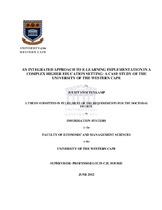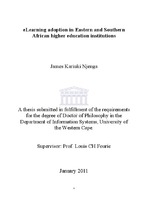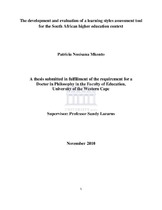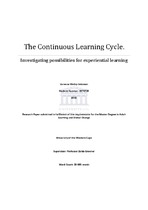An integrated approach to e-learning implementation in a complex higher education setting: a case study of the University of the Western Cape
Abstract
There has been a global transformation of higher education institutions (HEIs) in response to a wave of dynamic education sector reforms; specifically, this is related to the adoption of educational technologies to enhance teaching-and-learning practices, education management, research and administration. This situation has placed a strain on HEIs in South Africa and elsewhere, due to changing societal expectations, the inevitable integration of technology, and specifically eLearning into traditional
interventions; and at the same time, the increasing pressure on practitioners to deliver quality education. Equally important, the question arises whether Information and Communication Technology (ICT) is indeed constructively impacting teaching-and-learning practices. Consequently, a need has arisen for ePedagogy training and support for academics and students within challenging, complex HE settings. Within this context, the research has endeavoured to position the eLearning discourse within a global perspective; as well as to explore the theoretical underpinnings which impact the application of learning, and specifically eLearning. In particular, the merging of learning theories; different teaching and learning approaches, and technology that enables the creation of effective eLearning models and provides a more structured approach to the implementation of eLearning, were studied. Building on this theoretical basis, the importance and content of models within the discourse have highlighted the recent
emphasis on the delivery of quality education. The principal thrust of this research was, therefore, to highlight the main developmental phases towards the creation of an Integrated eLearning model to influence organisational cultural change in Higher
Education Institutions. The research was built on an in-depth case study of a large HEI, namely: the University of the Western Cape (UWC), over the period September 2005 to October 2011. This explorative, longitudinal study was undertaken because of the numerous “unsuccessful” or “incomplete” eLearning implementations in developing countries, as well as the many challenges faced by academics. As a result, the study explored the factors that contribute to the successful implementation of eLearning
within the empirical setting of UWC, a complex higher education environment. This has been an accumulative exercise that started shortly before the establishment of the E-Learning Development and Support Unit (EDSU) and the ‘eLearning Awareness Campaign’ – reflecting on the deployment of a non-coercive approach to the implementation of eLearning and its impact on the organisational culture of the institution. The result was the development of an Online Course Creation model, which forms the core of phase 1 (September 2005 – December 2006) of the case study.
Subsequently, phase 2 (January 2007 – August 2008) of the case study showcased gaps in the Online Course Creation model and emphasised that eLearning implementation in a complex higher education setting should go beyond the focus on ePedagogy with regard to effective online course creation. Hence, this second phase of the case study involved the development of a revised eLearning model, the Inclusive ePedagogy model. Consequently, phase 3 (September 2008 – October 2011) of the case study highlighted the main developmental stages implemented in the creation of a final Integrated eLearning model, and discussed how these integrated factors contribute to the implementation of eLearning, and ultimately, influence the organisational cultural change within UWC. Interaction with various stakeholders during the phases of the study included interviews and questionnaires. As a result thereof, the research reflected on the exponential growth of eLearning; improved attitudes and mindsets; strategic commitment for the infusion of technology and ePedagogy; and the institutional teaching and learning strategy. On the other hand, these results are in stark contrast
to the lack of management in the development of the home-grown Open Source platform, coupled with intermittent access to internet connectivity. This shortcoming has often hindered online teaching and learning initiatives and support processes.
Furthermore, the research has indicated how educational technology has positively impacted on prevailing communities of practice, and has even led to sound practices, such as sharing online courses/modules within the institution and with the global community. The escalating numbers of students seeking eLearning training and support have been supported by blended eLearning approaches. These approaches reflect the importance of integrated curriculum design. Moreover, the presented Integrated eLearning model, shows that ‘eLearning success’ can never be claimed, but is rather a process undergirded by a dedicated support team committed to continuous eLearning marketing, together with the review of processes within dynamic, complex higher education settings. Equally important, eLearning implementation within a HEI inherently impacts the organisational cultural changes. This is not just a once-off event, as it entails the difficult task of changing mindsets toward the use of new pedagogies, in order to supplement traditional instruction. At the same time, considering people-development processes; as well as organisational issues, which include peoples’ perceptions at different times of the eLearning continuum, is presented as various
factors, which contribute to the successful implementation of eLearning. The most important factors contributing to successful eLearning implementation, as established through the research, and also incorporated into the proposed Integrated eLearning Model are: the provision of holistic online activities; integrated institutional ICT infrastructure and systems; the support of educators and students; the necessary positive attitude by lecturers to take a hands-on role in the application of blended eLearning practices – aligned to research – and the contribution to the knowledge era; the importance of communities of practice within and outside the institution; the need for motivated formal leadership and educators to take ownership of the development of aligned, integrated curriculum strategies supportive of emergent educational technologies; continuous commitment to eLearning support, and quality-assurance processes; sustainable eLearning change management and marketing strategies; as well as crucial integrated professional leadership, management and support of the
elements of the Integrated eLearning model.
Collections
Related items
Showing items related by title, author, creator and subject.
-
eLearning adoption in Eastern and Southern African higher education institutions
Njenga, James Kariuki (University of the Western Cape, 2011)This research was undertaken to propose a model for eLearning adoption in Higher Education in Africa and to identify and empirically test measures to assess the model. The model identified eLearning, individual and ... -
The development and evaluation of a learning styles assessment tool for the South African higher education context
Mkonto, Patricia Nosisana (University of the Western Cape, 2010)A literature study focusing on teaching and learning in higher education in South Africa was conducted. Theories relevant to adult learning were also examined. These included behaviourist, cognitive, humanistic and social ... -
The continuous learning cycle. Investigating possibilities for experiential learning
Welby-Solomon, Vanessa (University of the Western Cape, 2015)Scholars focusing on experiential learning argue that experience should be considered as critical for adult learning. This research paper frames experiential learning within a Constructivist framework. This paper focuses ...




